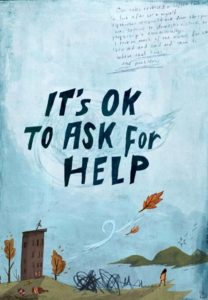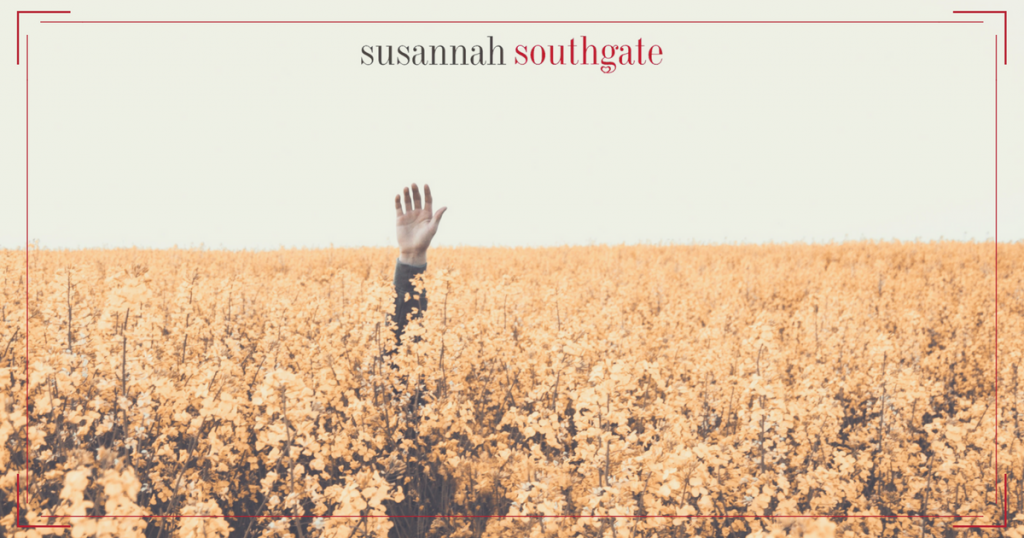A friend called me today, in tears and needing help. On hearing how upset she was, I felt grateful that I had seen her in-coming call and put my busy day aside to answer the phone. I am not sure how useful I was to her; but what I hope she gained from our call was a validation that asking for help is never wrong.
Few of us are practiced in asking for help. Most of us have learned to muscle through, work it out and do it all alone. Perhaps we were taught that asking for help is a weakness, or a sign of failure. Or perhaps we feared all too young that if we asked for help no-one would be there to answer.
I was recently working with a coaching client, one of the strongest, most capable and successful men I know.
And yet what transpired from our call was both how desperately he needed to ask for help in his life; and how alien doing so really would be for him.
This is a man who works incredibly hard and who holds it all together both at home and at work. From the outside, he looks like Superman, and does everything he can to be that – for his wife, kids, colleagues, team. But, inside he is being crippled and isolated by his own strength and self-sufficiency.
Like many of us, what he longs for most is a deeper source of connection and intimacy from everyone around him. And, yet ironically, those are the very things that he will never fully get until he becomes easier with asking for help and the vulnerability that evokes in him.
So, why is it so very hard to ask for help? What are we really scared it will say about us if we do? And what are the consequences of our not?
Asking for help requires a quality of vulnerability and authenticity that is essential in building trust. It requires humility and being human to say I can’t do this all alone. It requires relational skills of being able to support and be supported. It illustrates our ability to collaborate and foster team-working.
All these qualities go toward making us far more likable and approachable than we realize; but unpractised they can often feel excruciatingly vulnerable to embody.
 Asking for help is a practice few of us have learnt.
Asking for help is a practice few of us have learnt.
In contrast, what we are practised in is self-sufficiency and doing it alone. If you doubt that, take a moment, to see how many times a day or week, you really ask for help.
An exercise I gave my Superman client – to help build his awareness and to strengthen his muscle of asking for help – was to keep a daily record of how often he actually asked for help. He returned to his next session sobered by how rarely he ever even asked.
So, this week, I invite you to take a similar look. Do you ask your partner for help around the house or simply complain internally that you are left to do it alone? Do you ask the kids to empty the dishwasher; or a colleague to help you on a challenge at work?
When you are racing to collect the dry-cleaning, ahead of picking up the kids, before visiting your parent in hospital, do you think to ask for help or struggle on alone?
At work, when you find yourself bombarded by calls, meetings, emails and demands do you even see the places where you might delegate or ask a colleague for help?
Behind every complaint is a request.
So, if you feel stuck to find opportunities to ask for help, look for where you are resentful or complaining – these will inevitably be the places where you need some help.
As you look, you may see all of these opportunities to ask for help as being tiny and inconsequential to your leadership or the real challenges in life. A voice may tell you not to bother asking for help when you are so capable and practiced in doing it alone.
But, if we have no skill in asking for help on those everyday, small things in life; we will never know how to ask for help on the bigger challenges that will meet us.
Asking for help needs to be a skill that is practised and embodied so that it becomes a reality in our living, regardless of what we are facing. We may kid ourselves that we don’t need this skill, but life will eventually find a way to catch us out. The biggest deceit is to imagine we can do it all alone.
Self-resilience and independence are essential qualities to cultivate for an empowered sense of self, but we are in danger of creating a world that has taken self-sufficiency to unhealthy extremes.
Great leadership requires that we ask for help.
Who would actually trust someone who did it all alone? Who would follow someone who never knew to say I cannot do this by myself? Who would want to follow someone where they did not feel needed?
Asking for help illustrates our humanity and humility. It also requires that others step in to help us, it invites others to feel needed and useful. There are huge gifts in being able to be the one to help another.
It is our contributions to others that support our well-being, meaning, and place in community. Helping others is what helps us build our sense of worth and place of belonging. We all actively need places where we can be the one to help.
We live in an era where it is easy to focus on the many the ways we are becoming ever more singular and isolated. Asking for help is a powerful way to bring in more connection and intimacy into our lives, relationships and work teams.
When my friends rang today and asked for help, I listened intently and gave her the space to feel heard. But there was little that I could practically do to give her what she needed. And so I sent her request out to some friends and they in turn to their networks. And what I got to witness today was something immensely warming, as strangers stepped into to help a friend of a friend with no gain to their own involvement.
In a world where a sense of loneliness and disconnect is reaching epidemic proportions, it may just be the opportunities to help the friends, colleagues and strangers around us that has the world feel a friendlier, more connected place.
So, humbled by my friend’s reaching out for help, I too this week will be tracking where I can better ask for help – learning, like my Superman client, to build new muscle and skill in the art of reaching out.
As always, I’d love to hear your comments and reflections. And, if you liked this blog post, and would like to read others, please sign up to my email list, where you will receive my weekly blog posts, transformative tools and exercises, and information on future workshops that I will be hosting CLICK HERE.
And, if you haven’t already, please join my Facebook page and add your comments and reflections there.

Very helpful for me right now. I’ve been doing a lot of work around the long-term impact of being sent away to boarding schools from 8-18, including, finally, revisiting both schools for the first time. The single thing that plays out most damagingly in my life now, aged 51, husband and father, is the belief – branded on me at that time – that there is no point ever asking for help, especially with deep feelings and needs, as they will not be heard, validated, responded to or likely even believed. I was miserably homesick at school for years, and it made no difference; I was entirely unheard and no parental decisions were changed or even debated. Now, I have learned to build a strong support network around me – therapy, coaching, a men’s group, Shadow work – and that soaks up much of the toxic remnants of this learned behaviour, and allows me to be vulnerable and receive support and help, but the one place I still find it completely un-natural and weird and terrifying to bring my needs, or make a request for help and support, is my 20+ years intimate relationship. It feels as though (or rather I erroneously believe) it would poison our marriage to bring my fears, my doubts, my mess, to my partner, because to bring such things to my most intimate relationships – as I tried to do when I was 8 – is pointless and too painful to be rejected again, so I just don’t (usually) do it. And she is knocking gently and persistently and patiently at my slammed door, reminding me she is there and that she is not my parents and she wants this sharing, indeed craves to just see all of me, including my needs, and it is so hard to believe, still, after so many years. So for me, this topic is experienced through the lens of the unheard child, and he/we are working slowly and persistently to change it, so that I can and do ask for help when my instinct is to suffer and survive alone.
So beautifully and authentically put, Simon – thank you! I too believe that for many of us the difficulty in asking for help stems from “the lens of the unheard child”, as you say. It just is so hard for that part of us to truly believe others may want to help and support us. It’s why I advocate starting with the small stuff – the places where it feels less vulnerable – so that we can start to both gather evidence that we can actually survive asking for help, and so that we start getting better habituated in the skill of reaching out. Hopefully those around us will then show us that our asking for help brings us closer into fulfilling relationship. And then the other work is to build a self resilient enough to weather the “no’s” when they come. But that’s a whole other blog! Thanks for your contribution to this conversation – so rich!